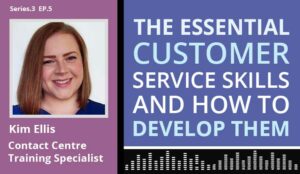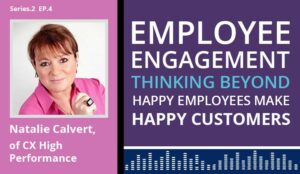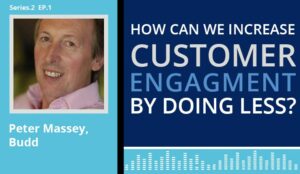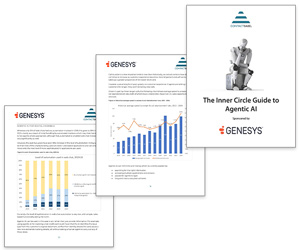The Contact Centre Podcast: Series 3 Episode 5
Kim Ellis, a Contact Centre Training Consultant, discusses the keys to improving skills like empathy, active listening and knowledgeability in the contact centre.

In our discussion, we also discuss training exercises that will help to develop these skills further, while Kim makes reference to a number of her own contact centre experiences along the way.
To listen to the podcast directly from this web page, just hit the play button below:
The Contact Centre Podcast – Episode 17:
The Essential Customer Service Skills And How To Develop Them
This podcast was made possible by our sponsor, Genesys.
Podcast Time Stamps
- 2:09 – Training Empathy
- 4:42 – Improving Listening Skills
- 10:09 – Developing Advisor Knowledge
- 13:11 – Dealing With Difficult Customers
- 18:34 – Changing Mindsets
- 25:14 – Increasing Advisor Motivation
Here is a Transcript to the Podcast
Charlie Mitchell: Empathy is a key skill for contact centre advisors, but what advice do you have for building empathy amongst the contact centre team?
Kim Ellis: Well, teambuilding activities really help to gel a team together, which in turn will build their self-awareness, their empathy towards each other and for your customers. A good activity here would be role-playing activities. They can really help with building self-awareness and building empathy. But not everybody’s comfortable taking part in these. An alternative would be to give them a scenario where they can work as a team to say what they would do, how they’d approach a problem, how they would speak to a customer, and if your team’s too large to do that, have multiple scenarios going side by side.
Charlie: For these role plays, I always think it’s quite interesting in the contact centre, I know some people do it with just two advisors and everybody watches them. But I’ve heard another better way to do it in groups of threes, with two people actually doing the role play and another being the observer. Do you think that’s a better way to approach it?
Kim: I do. I think having them in their own space is a lot better. If you’ve got multiple rooms that you can use or you can send some people out to a breakout area to do it and then they can come back and report back to the group, present their findings back to the group. I have done role plays where there’s two people in front of the whole class of 12 and it’s almost uncomfortable to watch. You get some people who relish it, you’ve got your extroverts who love to be in that kind of situation, but if you pair a couple of introverts together, then it’ll just be a disaster. They can’t focus. They’re more concerned about what people are thinking about them rather than concentrating on what they should actually be doing about the role play, about the scenario. I think putting them in threes or even fours, where a couple of people can look at it from different perspectives. One from the customer perspective, one from an agent perspective, is really useful.
Charlie: Yeah, I do think generally, though, I will say that role playing is a really great activity. I don’t think there’s a better activity for induction training really to get people very much used to the format of everything. And I like the idea of having that observer on the side. You can kind of point out. It’s not just the two people that are role playing, figuring everything out for themselves. They are often adding another outside-in opinion, which can also be great. That’s great in terms of building empathy and I think to show real empathy that we also need to be listening carefully to what the customer is saying. Do you know of any fun training exercises to develop active listening as a key skill also?
Kim: A great activity that I’ve used many, many times, especially in complaint handling training where we’re dealing with a lot of angry customers, is the Witches of Glum. Have you ever heard of that one?
Charlie: Yeah, I have heard of it. I’m not… I can’t entirely remember how it goes though, so a quick… yeah, would be great to hear.
Kim: Basically you read a story which is about the Witches of Glum and then you ask them a set of questions. What colour is the hat? What were they doing? And then they’re answering true or false or putting different answers on their checklist and then you read the answers out to them. But it’s a really good one for active listening, but also for getting them to not make assumptions, because that’s the real thing about the Witches of Glum. It’s about not making assumptions based on what you’re hearing. And an alternative to that is a Goldilocks story as well, which has the same kind of thing. But I always go for the Witches of Glum because I’ve been using that one for years.
Charlie: Yeah, I’ve heard of a game very similar to that as well. And I think it’s… I love the premise and the game that I’ve heard of is when you ask advisors a simple question, such as how many of each species did Moses take onto the Ark? But most people will say two, but I said Moses and not Noah. The correct answer is actually none. And this gives those lessons that you were reinforcing there that when we make assumptions we don’t truly listen to the customer’s problem and that we must check our understanding to show empathy. I think it’s games like that that can be really useful to making these points that may seem kind of obvious from the outside, but when you’re taking call after call, all the time, your concentration can easily slip. I think that’s a really great… that games like the Witches of Glum, as you say, can be really great for building soft skills.
And I think on this topic of refocusing advisors, many advisors will have these skills such as empathy and active listening, but it can be difficult to maintain good listening and empathy skills throughout the entire day. What advice would you have for helping advisors to refocus?
Kim: Well, this is kind of, this is a difficult one because I was a call centre advisor for quite a few years before I became part of the training team. And you’re told a lot of times to always treat every call as if it’s your first call. But I kind of disagree with that because I feel it’s much more important to treat every contact as if you’re talking to yourself or talking to a family member or a loved one. How would you want to be treated? How would you want to be spoken to?
If you try to treat every call the same, then you run into the risk of making assumptions, of not actively listening and of ultimately not making every customer feel that they are your only customer. Whereas if you treat them as if it was yourself or a family member, then you’re going to do your absolute best to get their situation resolved as quickly as possible. If you’ve had a challenging call, then it’s really good to just take a moment, take a breath, before you answer the next one. Take a moment just to compose yourself so you can give the next call your full dedication and give that caller a fantastic customer experience.
Charlie: Yeah, absolutely. I think this goes back to the role of the team leader for me, because team leader conversations can be key to refocusing the advisor mindset, and telling advisors that just to think of this customer as maybe a close friend or as a relative, as you say, can be really great to refocus their minds and freshen, make sure that they’re focusing on the customer’s experience. And this role between team leaders and advisors is really key for me. What advice would you have for team leaders in helping to develop advisor soft skills?
Kim: Some advisors are going to have a thirst for knowledge. They’re going to want to continuously improve. They’re going to want to progress through the company. These types of advisors are the ones that team leaders will nurture. They are the ones that managers will see standing out from the pack of advisors. Other advisors see it as just a job. They want to come in, they want to do their job, they want to get paid, and that’s it. And these people can sometimes be reluctant to learn new skills or to develop the knowledge. Their team leaders really need to get to know what motivates those people and how to get them to want to develop themselves, because you can’t force somebody to develop the knowledge because you’ll just get resistance. You’ll just get people plodding through and not wanting to do an excellent job, not wanting to learn new skills. You’ve really got to try and hook them in to want to develop. Learning incentives, leaderboards, all those kinds of things can help with these.
Charlie: That’s very key to what you said in there and giving lots of different examples like leaderboards and incentives, because everybody has different core drivers as to what motivates them. If we can appeal to as many of those as possible as well, I think that’s really great in helping to motivate advisors to want to improve their soft skills. I think lots of great stuff, and I just want to move on now to another skill and that’s in developing the right knowledge. What advice would you have for continuously building on advisor knowledge?
Kim: Having a knowledge bank that advisors can access at the point of need is really great. Some advisors will want to develop their soft skills. Some advisors will want to develop conflict resolution or even technical skills, and giving them a nice comfortable place that they can just go to. Whether it is something that they can use in their downtime, in their break time or in between contacts, depending on how busy your contact centre is, is really important to get people to flourish and get them to want to learn. Give them access to as much content as possible, but make it micro, make it courses that only take a few minutes to complete or just little tidbits of information and then see if you can develop people into being the leaders of the next generation or the next contact centre team leaders.
Charlie: I really like the idea of having a knowledge bank, and supporting advisors with a good knowledge base is another great tip. But how we manage that knowledge can be quite a difficult task. One thing that I’ve seen work really well is creating a style guide for knowledge articles within a knowledge base and getting advisors to follow that and pass that onto a knowledge manager for consideration. And feedback is really great for helping to build a learning culture, which can be so beneficial for a contact centre. Do you have any perhaps quick little tips for contact centres who may want to create a better learning culture within their contact centre?
Kim: I would say, make sure that you’re not forcing it on people. Identify people within the call centre, call centre advisors who really want to learn and who love coaching people, who love buddying new starters and see how you can get them involved. Because call centre advisors are going to be much more likely to take things that have been developed by their peers rather than content that’s going to be forced upon them. When I first started out training, I became what’s called a line trainer. I was half on the phones and half training people. And I found having that understanding, I knew what people needed and I knew how they would take home the information or how I needed to explain things to people because I came from that world. That can be a really useful tip to get people from the environment rather than people from outside the contact centre or outside the call centre floor, should I say.
Charlie: Yeah, I think getting as many people involved and in the customer insight is very… is such a very useful thing. And building a learning culture involves everyone, not just the contact centre. I think that could be quite a narrow way to look at it. I think that’s a very good point. And I just want to move on now to just the nature of the change in the contact centre industry and with more customers expecting an effortless experience, it’s likely that contact centres are now going to be dealing with more and more angry customers. What advice do you have for supporting advisors through these difficult call types?
Kim: It’s much easier to allow a customer to blow off steam and to vent their frustrations, listen to them, and then respond to them in a calm manner, respond to their concerns. Don’t try and take early control of the call because if you’re interrupting the customer, their stress levels are going to increase and then you’re going to start getting into a bit of a battle with them. Who’s controlling the call? A lot of advisors will be like, “I’m the advisor, I know everything. I want to control the call.” But allow that customer to just vent at you because it’s going to get all their anger out of their system and then they’re going to be a lot more rational with you because when you’re going back to them with potential resolutions and addressing all of their concerns, they’re going to really understand that you’ve listened to them and that you treating them as an individual.
Charlie: I think this idea of letting the customer vent, it’s one that I’ve heard before, but I imagine it takes a toll on the advisors as well. Do you think we should also be developing resilience in coordinance with this strategy?
Kim: Yeah. A good tip to have with that when you’re listening to people vent, is to just listen to the words and don’t listen to the emotion behind them. Listen to the words, make some notes and don’t try to think of resolutions as you’re making the notes because you could miss something that’s really important to that particular customer. And it could be something that isn’t really a fact or an issue. It could be just a way that they’re expressing themselves to you. And the Witches of Glum active listening exercise really helps with building this type of skill as well. Make some notes and then address them in a calm manner.
Charlie: Yeah. I think this is interesting because as we speak about angry customers, I’m thinking about what other kind of customers do we have to deal with in the contact centre. And there’s so many other challenging types of customers that advisors have to deal with. And from what I’ve seen, one of the hardest customer types to deal with are with those really not actually angry customers, but those are so talkative and they keep you on the phone for much, much longer than necessary. How would you advise dealing with these very talkative customers as well?
Kim: My longest ever sales call was 72 minutes, and when I was a call centre advisor, I was one of the fastest. I could do a breakdown claim in under a minute. I could sell a policy in two, three minutes, less than five usually. 72 minutes was my longest ever sales call. And that was because the guy who came on, he was an old, he was retired, not going to say old, he was retired builder. My husband’s a builder. We just started chatting, we just started building that rapport and he came on for the most basic package that we sold, which was, basic UK recovery. And he ended up going away with the top package, which included a courtesy car and personal coverage to cover him in any vehicle as well. And the vehicle warranty, which Paternity Rescue used to sell, they don’t any more.
And this was the thing, my manager, my team leader, I could see him and I could see his temperature rising and rising and he’s like, “Get off the call.” And I was like, you know what? This guy who might not talk to many people, he’s come on for a service. And yes, I’ve sold him extra stuff that he did actually want. He did actually need, because through building that rapport, I was learning more about him and what his driving habits were. And he mentioned that he would go out with other people. And it wasn’t that I was selling him things that he didn’t need. He did. He did want them all. Just want to put that out there. But my team leader was like, “Get off the phone.” And I was like, actually, I’m not going to rush somebody through an experience.
If it was completely unwarranted, the call was done at 13 minutes and it was just chatter after that, then that would be a different thing. But this guy, everything that we were talking about was relevant to his experience and relevant to the type of cover that he was buying. It’s not always about average handling time. Average handling time is great. It’s a great metric, but the customer experience is the most important thing because it’s cheaper to retain customers than it is to go out and get new ones with advertising. If you have a customer that is like, yep, they’re fine. Then they’ve got no qualms about going somewhere else. Whereas you, if you have a customer that says yep every time I speak to them, they are fantastic. They’re going to stay with you between thick and thin.
Charlie: Yeah. I think obviously AHD, as you said, is a great metric for WFM purposes in terms of resource planning in the contact centre, but in terms of actually targeting advisors on as a productivity measure, it comes under close scrutiny. And I think that’s very wise. And I love hearing about your own experiences there. And I remember actually once we spoke before and you told me about how you thought when you were a young advisor in a call centre and you thought that because your talk times were low you must have been very productive. However, didn’t your manager once play you a callback and it caused you to think about soft skills in a completely different way?
Kim: Yeah, that was mortifying. It was probably the worst experience as an advisor that I had ever had. Forget all of the angry customers, forget the crying customers, which there weren’t that many, forget all of that. When my team leader, she sat me down in the conference room because we only had a conference room back in the day. It’s a big massive 12-seater table. And she sat me down, she’s like, “Right, listen to this call.” And it was a less than a minute call. That was it. It was a breakdown call that lasted less than a minute. And I’d got somebody on the way. Immediately I’m there thinking, yes, this is fabulous. I’ve sorted out their needs and somebody’s on the way, fabulous, great. And I just… I was monotone. It was horrid, it was mortifying. And that kind of experience as an advisor stayed with me throughout all of my training for that particular company.
Kim: And then when I moved to the next company, and still today, I still use that as an example. And my 72-minute call, because it’s those moments that really define you as an agent. My manager played this call to me and I was like, it’s horrid. I wouldn’t… I may as well have been a robot. There was no customer service there. There was no empathy, there was no soft skills. It was monotone. One-word questions: reg, colour, where are you? What’s the problem? It was that kind of thing. And it was horrid. If I could have had that call recording to use in my training to ask people to rate me as an advisor, I would have done. But I’m not sure what ever happened to that call, probably lost in the archives somewhere.
But it’s, that is a really useful tool. Find good calls, get your advisors to listen to them. Find ones where they’re not living the values. Find ones where they’re not showing empathy. Get a good range of different calls to get them to listen to and see what their reaction is. I was mortified. It may be that your advisor doesn’t know that that’s how they’re coming across.
Charlie: Yeah. I think that’s a very good idea to get people into a room, not listening to obviously individuals within that room’s phone calls, but listening to others, and that they may not then be hearing best practices for themselves, and identifying those practices where it may not be so great and encouraging that discussion can be a really great way to add onto advisor soft skills. I think, yeah, I think that’s a really great idea. And I know we’ve talked about angry customers and now talkative customers a lot. There’s one third and final type that I wanted to talk with you and what soft skills could an advisor use with this call type and that’s an indecisive customer. A customer that can’t make up their mind between they take off… they take a long time to answer your questions and they just can’t choose between one option or the other. What advice would you have for dealing with a customer like that?
Kim: It depends on your industry. You’re treading a very, very thin line there. If you are a financial industry, which I’ve worked in financial industries, you can’t give advice to that customer. You may know what exactly is the right thing for them to do, but you can’t tell them because you can’t coerce them. You can’t make them do something because that would be mis-selling. You’ve just got to listen to what they’re saying. Give them the different options, sell the benefits of those different options and sell the downsides of them. If one of your products doesn’t include something that you think is fundamental to that person’s needs, make sure that they’re aware that that doesn’t include this. This includes this, but you need to be very careful that you’re not seen to be forcing them down a particular route.
Kim: Make sure that you’re always giving them options and make sure that you leaving it with them and even offer a callback. Say, “Do you want me to email you some information out and I’ll call you back in half an hour?” Or, arrange a contact back with them if they’re really, really indecisive. They may want to speak to a family member or their partner to discuss it if it’s such a big purchase. If it’s a small, £20 thing, then they may be less indecisive than if it’s £200 or their pension or something like that.
Charlie: It’s not going into a call to force them into one option, but being prepared and as an advisor, to problem solve and be, as you say, be transparent and honest. I think that’s a really good message. I guess that comes down again to the problem-solving soft skill. Do you have any advice for developing problem solving as a soft skill in the contact centre?
Kim: Practice. Your scenarios, your role plays, all that thing will help with problem solving. If you have this, have a learning culture, or even if you don’t, email out a problem of the day and ask people how they would solve it, and then you could get somebody, an impartial manager maybe, to judge all the answers and then give out a prize to the most inventive answer or the most out-of-the-box answer.
Charlie: Yeah, I think that’s a really good idea. There was a contact centre I went to recently that played a lost-at-sea training game. They gave individual advisors a list of 15 items and they would say order these in terms of importance when you’re lost at sea and trapped on an island. And then they would list them and then they’d form together in a group. Then they would come up with a collective top 15 list and then they would report back to their manager after, so it was testing individual skills and then testing how people interact with the group is testing team cohesion as well, and then the final outcome and see if that list matches your own as the manager. I think that was a very nice exercise and I think it’s one of the kinds of problem-solving games that is just going to be another one to add to the list that you provided and I thought that was really great.
I just want to move on now to another question. Sorry for moving on from topic to topic so quickly. There’s just so many to talk about in this area. And one other great quality for an advisor to have is being easy to motivate. How would you look to increase motivation in the contact centre?
Kim: It depends on the type of contact centre, to be honest. It depends on how busy they are with what type of agents they have. If you have a group of contact centre agents who are quite young, then it can be really easy to motivate them. If you’ve got a group of contact centre agents who vary in different ages… so when I worked at LV they were, have 17-year-olds and we had 60-year-olds. All different backgrounds. And motivating them was sometimes quite challenging because you had to appeal not just to silliness but also to seriousness as well. I’m not saying which was which.
Kim: I found call centre bingo was a great motivator because everybody would get involved in that. Finding words that they had to get on a call or locations that they had to have somebody broken down in, that was a nice one. But yeah, finding different ways to motivate people and not always using the same method is really challenging. You’ve really got to know your industry. Doing something industry-specific or company-value-specific is really great. Getting somebody from the contact centre to be involved in motivation, to be the manager of motivation for that month. Getting them to come up with different ideas to motivate their peers and their team members. Don’t just leave it in the manager’s hands or training team hands, where’s the fun in that? Give the power to the people.
Charlie: Obviously a great message there, and I think it’s always great to have the advisors being involved in what that fun entails, even if it’s simple things such as contact centre games or more social event things where people will go out and, say, spend their own time with work colleagues. I think it’s always good to have an advisor be at the centre of that, to increase buy-in and so we’re not prescribing to advisors how to have fun. They come up with it themselves. Yeah, exactly. Is there anything worse?
I think that’s a very key point and I always think to hit the motivation in the contact centre that you have to hit three areas, and that’s purpose, having… making sure everybody’s got a purpose at work. Potential, to make sure that everybody’s got a development playing game. Maybe not everybody’s motivated by that, but there will definitely be people that are motivated by career progression. Then play, to have fun in the contact centre because everybody likes a little bit of fun at work. So I always think there’s three areas as well are really great to hit. But I think to stop me waffling on, I think we’ve sort of spoken about lots of great things. I just wanted to know where our listeners can go if they want to hear any more information from you, Kim.
Kim: They can follow me on LinkedIn. I am Kim Ellis, Tapped It training consultant. You can follow me on Twitter @Kim_goginger, or there’s my website, which is gogingerlearning.co.uk, where I have a couple of case studies for how I’ve implemented different things in different industries.
Charlie: Excellent. Thanks for joining us today, Kim.
Kim: Thank you very much. Pleasure.
Author: Jonty Pearce
Reviewed by: Jo Robinson
Published On: 17th Feb 2020 - Last modified: 26th Sep 2025
Read more about - Podcasts, Charlie Mitchell, Genesys, Kim Ellis, Podcast








































